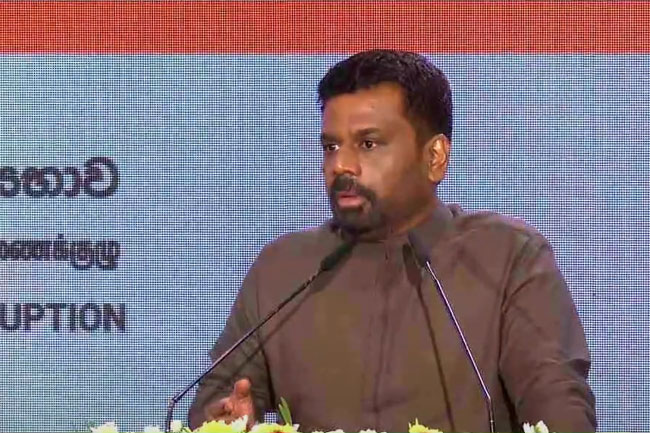Sri Lanka launches new National Anti-Corruption Action Plan
April 9, 2025 12:36 pm
President Anura Kumara Dissanayake has officially launched the National Anti-Corruption Action Plan (NACAP) 2025-2029 today, as a strategic initiative to reaffirm the country’s commitment to strengthening governance, enhancing transparency, and reinforcing the rule of law.
The Commission to Investigate Allegations of Bribery and Corruption (CIABOC) led the development of the NACAP, supported by the technical expertise of the United Nations Development Programme (UNDP) in Sri Lanka with funding from the Government of Japan, which amounts to approximately 900,000 USD through the project, ‘Promoting Economic Governance through Anti-Corruption Policy Support’.
The launch was attended by President Anura Kumara Dissanayake; Chief Justice, Murudu Fernando PC; Chairman of CIABOC, Justice Neil Iddawela; Commissioners and Director General of CIABOC; Mr. Akio ISOMATA, Ambassador of Japan to Sri Lanka; Ambassadors; High Commissioners and Heads of International Organizations; Secretaries; Senior government officials, and other high-level invitees.
As Sri Lanka continues its journey towards becoming a cleaner, greener, and more sustainable country, addressing corruption has emerged as a key national priority. The NACAP builds on the success and lessons learned from the previous 2019-2023 Action Plan aiming to provide a comprehensive roadmap for combating corruption at all levels of governance, a statement said.
Developed through extensive consultations with national and provincial stakeholders, the plan incorporates international best practices while aligning with the country’s constitutional and legal frameworks.
The launch of this Action Plan comes in the wake of Sri Lanka’s enactment of the Anti-Corruption Act No. 09 of 2023, a significant milestone in the country’s fight against corruption. The new plan focuses on fostering a Whole-of-Government and Whole-of-Society approach, emphasizing the need for inclusive and strategic action to address corruption’s far-reaching effects on economic stability and public trust.
Key Focus Areas of the National Action Plan include; Strengthening national legal and policy frameworks to combat bribery and corruption; Enhancing inter-agency cooperation to improve coordination among key anti-corruption institutions; Improving the quality and efficiency of investigations and prosecutions of financial crimes; Implementing preventive measures, institutional strengthening, education, and legal reforms across all sectors; and encouraging public engagement in promoting integrity and accountability.
Commenting on CIABOC’s leadership, Mr. R.S.A. Dissanayake, Director General of the Commission to Investigate Allegations of Bribery or Corruption (CIABOC) stated, ”Combating corruption requires more than just punitive measures. It is a deeply embedded cultural issue that demands a comprehensive shift in values—beginning with instilling integrity from early childhood. Accountability must be coupled with robust prevention mechanisms and support for witnesses who come forward with allegations. As part of our commitment to systemic reform, we are establishing an Internal Affairs Unit (IAU) within government institutions to ensure transparency and proactive oversight.”
Highlighting the Government of Japan’s commitment to support the people of Sri Lanka, H.E Akio ISOMATA, Ambassador of Japan to Sri Lanka stated “Transparency and good governance are fundamental pillars for sustainable economic development. For Sri Lanka to attract foreign investment and achieve a long-term growth, the elimination of corruption is indispensable. The effective implementation and continuous follow-up of the NAP are essential to the success. I would like to see all the relevant authorities, including politicians and government officials, work to translate this Plan into concrete action and to ensure accountability at all levels of governance.”
The Action Plan is structured around four broad strategic pillars—Preventive Measures, Institutional Strengthening & Enforcement, Education, and Law & Policy Reform—covering nine priority areas essential for an effective national anti-corruption strategy. It provides a detailed implementation timeline, with short-term, medium-term, and long-term objectives to ensure sustained progress.
Highlighting UNDPs role, Ms. Azusa Kubota, Resident Representative, UNDP in Sri Lanka stated, ”The National Anti-Corruption Action Plan is a roadmap for transformation across Sri Lankan society. When implemented in full, it will make corruption visible through structured, inclusive, and results-driven mechanisms. UNDP has been a steadfast technical partner in Sri Lanka’s anti-corruption efforts, from the first NAP in 2019-2023 and the Anti-Corruption Act of 2023. With a view to strengthening overall economic governance, we are committed to working with a wide range of stakeholders, including CIABOC, the judiciary, revenue collection agencies, independent commissions, the Parliament and citizens.”
The successful implementation of this Action Plan will require a collective effort from the government, civil society, private sector, and the public. As Sri Lanka strives to improve its global standing in anti-corruption measures, this initiative marks a significant step toward restoring public trust and ensuring a fair and just governance system for future generations, the statement added.












